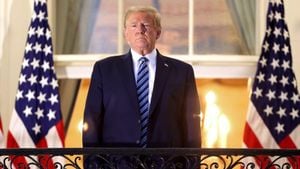West Bengal's potato supply dispute with neighboring states has plunged the region's economic and social fabric, creating waves of unrest and discontent. It all began last week when the Trinamool Congress (TMC) government, led by Chief Minister Mamata Banerjee, decided to halt potato exports to states like Jharkhand and Odisha. This decision has significantly impacted the prices of this staple vegetable, causing them to skyrocket and rippling through the local markets.
Potatoes, revered for their versatility and frugality, are ubiquitous across various dishes and hold special significance in the culinary sphere of Eastern India. Dishes like 'aloo posto' in West Bengal, 'dahibara aludam' in Odisha, and 'aloo chokha' in Jharkhand reflect this humble vegetable's importance to regional cuisines. Yet, ironically, this beloved ingredient is now at the forefront of political and economic strife, affecting countless households and food vendors.
Initially, potato traders initiated an indefinite strike protesting against the restrictions on potato sales, but they withdrew upon receiving reassurances from state Agri-Marketing Minister Becharam Manna. He indicated he would discuss their concerns with Chief Minister Banerjee. It appeared there might be some hope of resume supplies.
Manna provided insight during speeches addressed to the state assembly, explaining the rationale behind the ban. "Our harvest was significantly delayed this year due to irregular rainfall, which has led to lower overall production," he noted. This spurred concerns for the state's immediate potato needs until the next harvest begins. He stated the government had to rely on cold storage reserves until January, which were not sufficient to meet demand and distribute to neighboring states.
Data from the state Agrarian Statistics revealed there were 58.84 lakh tonnes stored this year, down from last year's 63.58 lakh tonnes. With consumption rates hovering around 60 lakh tonnes annually, the TMC government fears inadequate local supplies will mean scavenging from cold storage.
“To safeguard the interests of the people of West Bengal, we have to continue these restrictions. Traders have attempted to coerce the government, but we won’t yield to their blackmail,” Manna asserted. The situation was compounded by accusations from the minister against certain traders, alleging collusion with the Bharatiya Janata Party (BJP) at the Center who reportedly exported potatoes to Bangladesh earlier this month.
Against this backdrop, the pricing impact has been severe. Reports indicate rising potato prices surged from Rs 32-33 per kg to approximately Rs 45-50 per kg within mere days—headlining the hidden costs associated with political maneuvering.
Odisha and Jharkhand, heavily dependent on West Bengal's potato supply, are feeling the brunt of this economic clash. Market insiders estimate Odisha imports nearly 90% of its potato supply and needs about 13 lakh tonnes annually. This supply disruption has virtually jeopardized food security for many households. The state government has been engaged with West Bengal officials, hoping for a resolution. “We are constantly communicating with their officials to resolve this pressing issue,” Odisha’s Food Supplies Secretary Sanjay Singh confirmed.
Similarly, Jharkhand's Chief Minister, Hemant Soren, has expressed alarm at the prospect of acute potato shortages, as his state relies on up to 60% of its potato needs from West Bengal. Following rising apprehensions, Soren directed his Chief Secretary to negotiate directly with West Bengal's counterpart for decisive action on this matter.
Despite the rising tensions, the situation escalated politically as various parties began firing accusations at each other. The BJP has wielded this opportunity to criticize the TMC for its 'undemocratic' actions. State Leader of Opposition Suvendu Adhikari claimed, “The state government can’t make such choices without consideration for its citizens. They simply lack proper agricultural foresight.”
Meanwhile, the Biju Janata Dal (BJD), leading Odisha, also laid blame on the West Bengal government, criticizing its erratic handling of the matter. BJD secretary Pramila Mallik articulated the residents' frustration, calling for the TMC to stabilize the vegetable markets swiftly. “The government should focus on the people’s concerns rather than indulging claims of efficiency,” Mallik scoffed.
BJP MLA Saroj Padhi extended the blame to the previously ruling Odisha government. The finger-pointing continued without any substantial resolutions—exacerbated by the shackles of political rivalry. The core issue, of course, remains the potato restrictions affecting the cross-border supply.
The potato stalemate is not just affecting prices but is indicative of larger, intertwined issues of agricultural policy and inter-state relationships. The situation presents pivotal learning moments on how local policies can inadvertently lead to regional crisis situations.
Economists worry this dispute might foretell upcoming complications as West Bengal heads toward its 2024 elections, with agriculture expected to be pivotal. An economist's assessment indicated, "Political decisions should reflect the agricultural reality to prevent unwarranted disruptions to trade, especially for staple commodities."
While traders seem optimistic about regularizing the potato supply, the impending question looms—will the state government relent? Or will this dispute set the stage for future conflicts? Only time will tell how this high-stakes game of trade impacts the economy and the everyday citizens it serves. What is clear, though, is the ultimate victims remain those reliant on this ever-important tuber as they feel the bite of rising prices and dwindling availability. This chaotic saga serves as both caution and commentary on agricultural policies and inter-state relations contributing to the much larger narrative of governance and social obligation.



